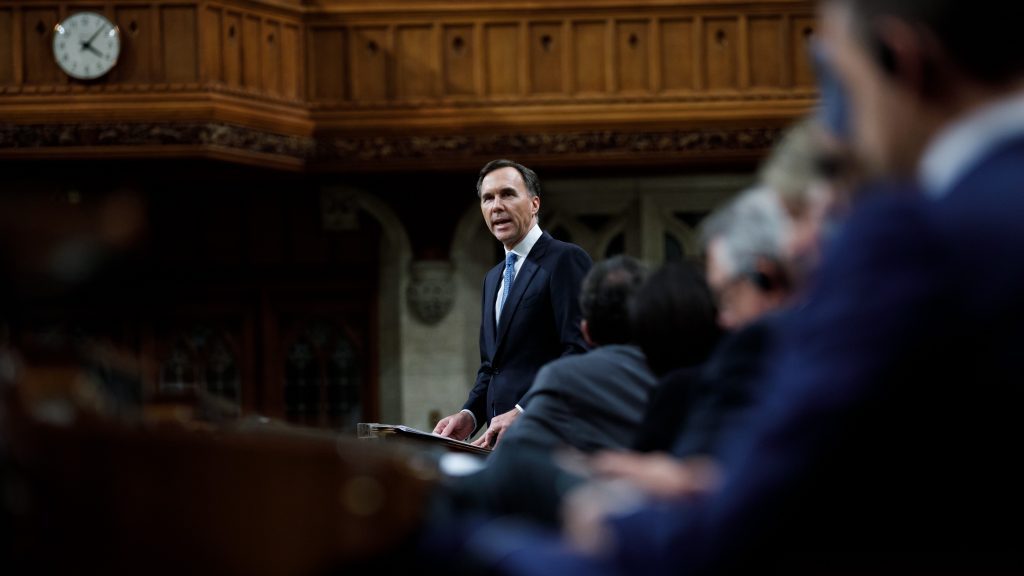Construction stakeholders at the national level agree the government’s fall economic statement contains a number of positives for the industry, with prompt payment, the accelerated depreciation of equipment and investments in training and export-enabling infrastructure topping the list.
The statement, entitled Investing in Middle Class Jobs, was released by the Department of Finance on Nov. 21.
Pierre Boucher, chief executive officer of the Mechanical Contractors Association of Canada, said the inclusion of prompt payment legislation in the statement indicates it should appear in the budget when it comes forward before April next year.
“Given that it’s an election year, we were nervous about the timeframe of it, but now that it’s been captured here, we feel a lot more confident that that will take place,” he said, adding innovative solutions are needed to solve the problems with the payment process in the industry.
“Maybe one day we will have an intelligent payment system where you have a bank account open for the purpose of the project and nobody touches that except the people receiving the money for their progress payment,” explained Boucher. “If there is a deficiency on the site that needs to be fixed and that is worth $20,000 the system could withhold that money but the rest of the money would still be paid instead of withholding everything.
“With this step you have all the measures in place identified for a system like that to eventually be considered.”
Sandra Skivsky, chair of the National Trade Contractors Coalition of Canada, said the strides made on prompt payment demonstrates the government values the construction sector.
“Whether it shows up as a bill or part of the budget, this is a very important step for the government,” she said. “Payment delays are one of the biggest issues facing trade contractors. It affects their cash flow, their ability to take on apprentices, hire more workers, invest and make their own payments. It also prevents them from bidding on more jobs.”
Canadian Construction Association President Mary Van Buren said the commitments outlined in the statement indicate the government is listening to the construction industry and confirms many of the association’s “asks.”
She was particularly pleased the statement is proposing three immediate changes to Canada’s tax system.
According to the statement the measures include: allowing businesses to immediately write off the cost of machinery and equipment used for the manufacturing or processing of goods; allowing businesses to immediately write off the full cost of specified clean energy equipment to spur new investments and the adoption of advanced clean technologies in the Canadian economy; and introducing the Accelerated Investment Incentive, an accelerated capital cost allowance (i.e., larger deduction for depreciation) for businesses of all sizes, across all sectors of the economy, that are making capital investments.
“That will free up their (businesses) capital and cash flow. That is important for two reasons: one is they can then reinvest in their businesses, they can purchase more equipment, technology…or they will have more liquidity which will allow them to bid on more projects,” explained Van Buren.
We will continue to keep an eye on the flow of the $180 billion
— Mary Van Buren
Canadian Construction Association
“We found that some of the asset classes are now written off up to three times faster than they were and that is something CCA has been advocating for. Trucks are on that list as well and many of our construction firms use trucks and heavy equipment, so that’s a big advantage for them.”
The initiatives laid out by the government will also help enable Canadian construction firms to compete more effectively in Canada and around the world, said Van Buren.
“CCA and our members were increasingly concerned that the business investment climate was becoming less attractive,” said Van Buren. “This is a real boost to helping Canadian businesses remain competitive and to help close the gap between Canadian business and American businesses. This should help attract and continue to keep new investment coming into Canada.”
The government stated it will invest $198 million over six years towards businesses that are looking to develop export plans, build global partnerships or gain skills and training for global trade by providing funding to Canadian small and medium-sized enterprises to help them explore new export opportunities.
According to the statement, in June, the government announced an investment of $50 million over five years to support businesses, including in the steel, aluminum and manufacturing industries, in diversifying their exports, including new export readiness grants. The government is proposing to build on this by investing a further $100 million over six years.
“It will help Canadian businesses be more successful in other markets,” said Van Buren. “What the government is trying to do is to encourage diversification from the U.S. into other markets, so the benefit to the industry is that there will be more infrastructure being built to enable Canadian businesses to export.”
An Apprenticeship Incentive Grant for Women and the Pre-Apprenticeship Program, including the Women in Construction Fund (Budget 2018), were also reiterated as a focus area in the statement.
“Workforce is a significant concern across the country and we as an industry have been working to attract many of the underrepresented groups — women, Indigenous, newcomers, youth,” explained Van Buren. “If we can grow the number of those workers that will be very helpful to our businesses who are really in need of workforce.”
There are two areas that were not in the economic statement that the CCA is continuing to monitor.
“One is that the tariffs are still there under the USMCA and this is seen as a possible drag on projects and introducing some delays and some uncertainty. That is something we will continue to keep an eye on,” said Van Buren.
“We will continue to keep an eye on the flow of the $180 billion (infrastructure funding).
“Many of the provinces have still not committed any of their funding from 2018 so that is something that we need to make sure the funds are actually coming into the municipalities and the infrastructure is being built.”











Recent Comments
comments for this post are closed